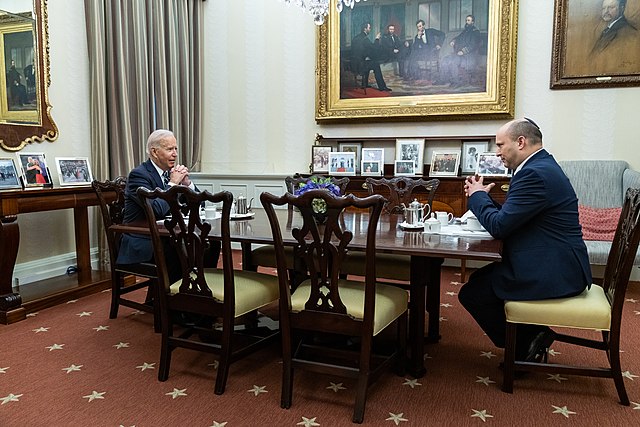On the surface, Prime Minister Naftali Bennett’s August 27 meeting with US President Joe Biden didn’t appear to carry much significance beyond a public display that the US-Israel relationship has – for better or worse – survived the politically tumultuous last few years.
The White House meeting had been delayed by a day following the deadly August 26 suicide attack at the Kabul airport that came in the midst of Washington’s speedy withdrawal from Afghanistan after two decades of occupation.
From a strategic perspective, this was the most advantageous possible time for an Israeli leader to meet with a US president.
Biden’s popularity was at an all time low and he was perceived as weak following the fiasco in Afghanistan. If an Israeli leader needs to meet with the US president, this meeting was planned at a moment where Biden was least likely to make aggressive demands for Israeli territorial concessions or to block Israeli actions against Iran (this is especially important following Foreign Minister Yair Lapid’s agreement to coordinate Israeli moves on Iran with Washington).
But the meeting is still worth some analysis if we want a sense of what expectations Biden expressed.
One area worth focussing on is the Biden administration’s demands of Israel when it comes to investments from China. It was reported last week that a senior government source said that Bennett plans to take action according to Biden’s expressed wishes. The source did not, however, specify what those action might be.
Among the possibilities could be moving the committee overseeing major foreign investments from the finance ministry to the national security council directly under Bennett’s authority.
The Bennett-Lapid government has meanwhile delayed a tender to build part of the Tel Aviv light rail because a Chinese company bid has made the situation diplomatically sensitive.
Like the administration of his predecessor Donald Trump, Biden’s team has expressed concern over the extent of Chinese investments in major Israeli infrastructure projects – most notably the Haifa Bay Port operated by the Shanghai International Port Group. Although former Prime Minister Binyamin Netanyahu responded to Trump’s pressure by establishing a committee to review foreign investments, that panel had been largely cosmetic for the purpose of placating Washington.
While Netanyahu had mastered the art of softly outmaneuvering Washington, there have so far been no indications that Bennett has the skill – or even interest – in resisting US pressure.
Another example of a subtle change that may have resulted from Bennett’s meeting with Biden is the replacement of the Israeli Tavor assault rifle with the American M4 in many of Israel’s combat units.
Israel Hayom reported earlier today that IDF infantry units will start phasing out the Tavor in favor of the M4 – a surprising development given the fact that the Israeli-made Tavor has been marketed for the last decade as the rifle of the future.
Despite its lightweight convenience and proven reliability in the field, the Tavor is suddenly being replaced by the American “flat top” M4 with no real explanation. The switch was likely a directive given by Washington as part of its broader aid package that serves to increase Israeli dependency on US arms.
The last feature of the August 27 meeting worth noting was Bennett’s display of his Jewishness. The makeshift hotel Synagogue leaked to the press and the reference to the Haftara portion that appeared to have literally put Biden to sleep during the meeting were most likely primarily intended for Israeli public consumption.
Despite his coalition greatly strengthening the forces of westernization in Israeli society and weakening the state’s Jewish character, Bennett often tries to play up the kipa on his head and present himself as Israel’s first overtly observant prime minister.
Fearing the loss of his electoral base and the end of his political career after betraying his voters by helping to establish the current coalition, Bennett wants to show the Israeli people that he’s a uniquely “Jewish” national leader (at least to the same extent as a Menaḥem Begin) and make us proud that he assertively promotes our culture by unashamedly speaking words of Torah to the head of the US empire.





